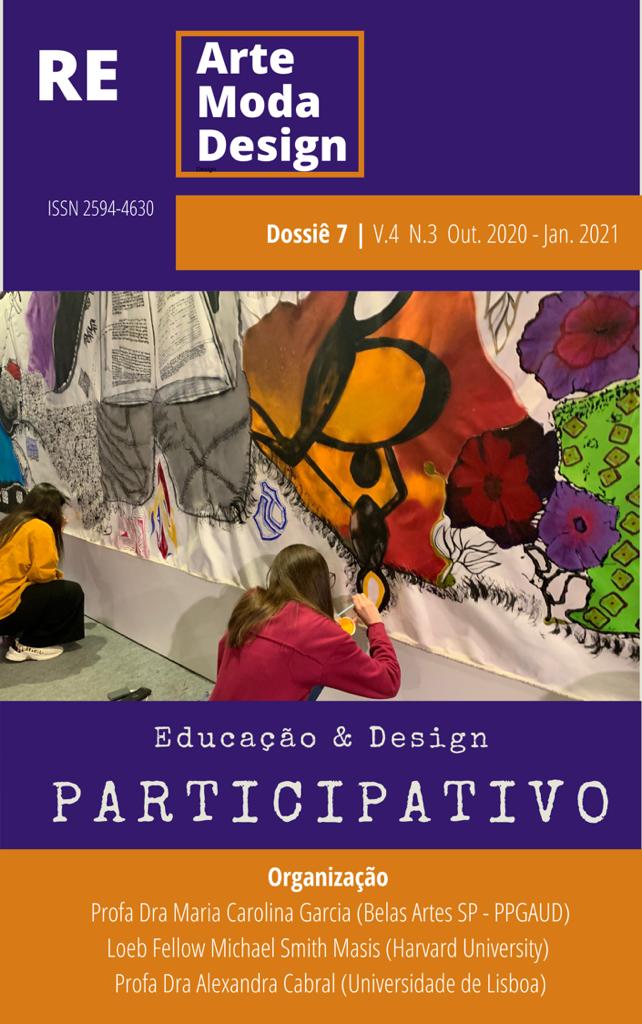CO-DESINGING WITH SUSTAINABLE PRACTICES IN FASHION DESIGN TEACHING
DOI:
https://doi.org/10.5965/25944630432020093Abstract
A questão da sustentabilidade é apresentada hoje como um dos principais desafios da sociedade moderna. Educadores e estilistas de moda têm a oportunidade de adotar um paradigma de pensamento humanizado, que se afasta das estruturas clássicas da moda rápida e que pode orientá-los para um novo conceito de moda ética e sustentável. A partir dessa abordagem, é possível trabalhar nos critérios de design, fabricação e consumo; mas também reativar a longevidade das peças de vestuário, aprimorando a experiência do usuário e o caráter fora de moda do produto. Nossa pesquisa é baseada no conceito de moda lenta e na aplicação de métodos de co-design, para incentivar o desenvolvimento de práticas sustentáveis na educação em design de moda, e que envolvem o processo de design e desenvolvimento de produtos, designers, pesquisadores, artesãos e diversas organizações sociais. grupos. A abordagem metodológica qualitativa foi abordada a partir da prática do design participativo, onde oficinas, táticas de hacking, empregando técnicas de decodificação de roupas e estratégias de design foram baseadas em critérios de otimização das peças de vestuário. A amostra incluiu 30 participantes divididos em 5 grupos, cujos membros adotaram diferentes papéis e ações dentro dos grupos. Também foram utilizados vários instrumentos de coleta de dados que mediram níveis de conscientização e impactos positivos sustentáveis nos participantes das oficinas.
Downloads
References
BIRTWISTLE, Grete.; MOORE,C.M Fashion Clothing-where does it all end up? International Journal of Retail Distribution Management, V. 35, n. 3, p. 210-216, 2007. Disponível em: https://www.emerald.com/insight/content/doi/10.1108/09590550710735068/full/html?src=recsys&
BLACK, Sandy. Eco-Chic: The Fashion Paradox. London: Black Dog Publishing, 2008.
CHEN,H.; BURNS,L. Environmental analysis of textile products. Clothing and Textile Research Journal. V.24, n. 3, p. 249-261, 2006. Disponível em: https://doi.org/10.1177/0887302X06293065
FAUD-LUKE, Alastair. Eco Design: The Sourcebook. London: Thames & Hudson, 2002.
FIORE, A.M.; LEE.S.; KUNZ, G.; CAMPBELL, J. R. Relation between optimum stimulation level and willingness to use mass customization options. Journal of Fashion Marketing and Management. V.5, n.2, p.99-107, 2001. Disponível em: https://doi.org/10.1108/EUM0000000007281
FLETCHER, Kate. Sustainable Fashion and Textile: Design Journeys. Earthscan. London: Sterling. 2008
FLETCHER, Kate. Slow fashion: an invitation for system change. Fashion Practice: The Journal of Design, Creative Process & the Fashion.V. 4, n. 2, p. 259-266, 2010. Disponível em: https://doi.org/10.2752/175693810X12774625387594
FLETCHER, Kate. Durability fashion, sustainability: The processes and practice use. Fashion Practice: The Journal of Design, Creative Process & the Fashion. V. 4, n. 2, p. 221-238, 2012. Disponível em: https://doi.org/10.2752/175693812X13403765252389
FLETCHER, K.; GROSSE, L. Fashion and Sustainability: design for change. London: Laurence King, 2012.
GALLOWAY, A., BRUCKER-COHEN, J.; GAYE, L.; GOODMAN, E.; HILL, D. Design for hackability. ACM. p. 363-366. ACM. 2004. Trabalho apresentado no 5th conference on Designing interactive systems: processes, practices, methods, and techniques.
ElSASSER, V. Textiles: Concepts and Principles. 3rd ed. New York: Fairchild, 2011.
PILLER, F.; SCHUBERT, P.; KOCH, M.; MÖSLEIN, K. Overcoming mass confusion: collaborative customer Co-Design in online communities. Journal of Computer- Mediated Communication, V.10, n. 4, p.00-00, 2005. Disponível em:
https://doi.org/10.1111/j.1083-6101.2005.tb00271.x
PINE, J. Mass Customization. Boston, MA: Harvard Business School Press. 1993.
POOKULANGARA, S.; SHEPHARD, A. Slow fashion movement: understanding consumer perceptions- an exploratory study. Journal of Retailing & Consumer Service, V. 20, p. 200-206, 2013. Disponível em https://doi.org/10.1016/j.jretconser.2012.12.002
SANDERS, E. B- N.; STAPPERS, P. J.Co-creation and the new landscape of design, Co-Design: International Journal of Co-Creation in Design and the Arts, V. 4, n. 1, p.5-18, 2008. Disponível em: https://doi.org/10.1080/15710880701875068
SANDERS, Elizabeth. B.-N. Design research. Design research quarterly, V. 1, n. 1, p.1-8, 2006a. Copenhagen, University of Art and Design
SANDERS, Elizabeth. B.-N Design serving people. Trabalho apresentado no Cumulus Working Papers, 2006, p. 28-33. Copenhagen, University of Art and Design.
SANDERS, Elizabeth. B.-N An evolving map of design practice and design research. Interactions, V. 15, n. 6, p. 13-17, 2008. Disponível em:http://grcd3021-f18.studiojunglecat.com/wpcontent/uploads/2018/08/LizSanders_AnEvolvingMapOfDesignPracticeAndDesignResearch.pdf
ULRICH, Pamela V.; ANDERSON‐CONNELL, Lenda Jo.; WU, Weifang. Consumer co‐design of apparel for mass customization. Journal of Fashion Marketing and Management: An International Journal, V. 7, n. 4, p. 398-412, 2003. Disponível em:
https://doi.org/10.1108/13612020310496985
VON BUSCH, O. Engaged design and the practice of fashion hacking: the examples of Giana Gonzalez and Dale Sko. Fashion Practice The Journal of Design, Creative Process & the Fashion, V. 1, n. 2, p. 163-185, 2009. Disponível em: https://doi.org/10.2752/175693809X469148
WU, Juanjuan. Co-design communities online: Turning public creativity into wearable and sellable fashions. Fashion Practice : The Journal of Design, Creative Process & the Fashion [online] V. 2, n. 1, p. 85-104, 2010. Disponível em: https://doi.org/10.2752/175693810X12640026716474
Downloads
Published
Versions
- 2020-10-01 (2)
- 2020-10-02 (1)
How to Cite
Issue
Section
License
Copyright (c) 2020 Desamparados Pardo Cuenca

This work is licensed under a Creative Commons Attribution 4.0 International License.
- Authors retain copyright and grant the journal the right of first publication, with work simultaneously licensed under the Creative Commons Attribution 4.0 International License, which allows for:
1. Share — copy and redistribute the material in any medium or format for any purpose, even commercially.
2. Adapt — remix, transform, and build upon the material for any purpose, even commercially.
The licensor cannot revoke these freedoms as long as you follow the license terms.Under the following terms:
1. Attribution — You must give appropriate credit, provide a link to the license, and indicate if changes were made. You may do so in any reasonable manner, but not in any way that suggests the licensor endorses you or your use.
2. No additional restrictions — You may not apply legal terms or technological measures that legally restrict others from doing anything the license permits. -
Plagiarism, in all its forms, constitutes unethical publication behavior and is unacceptable. This magazine uses iThenticate similarity control software.






